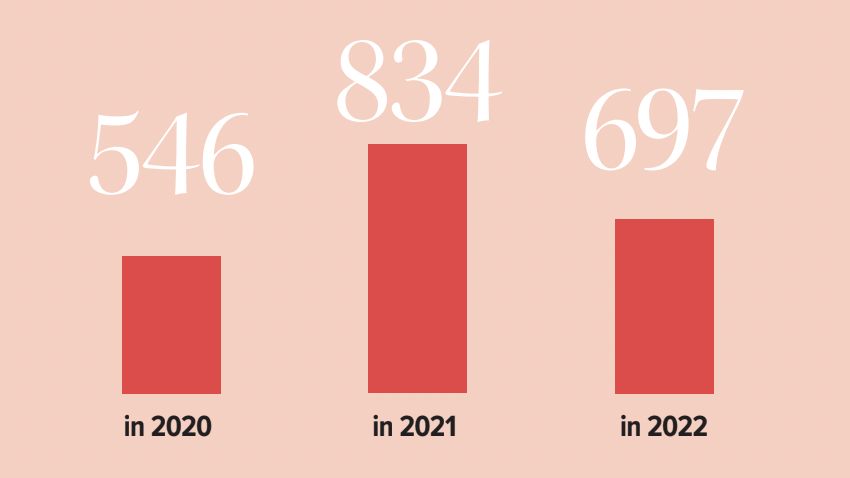VCU grant aims to empower unhoused through improv

Number of people experiencing homelessness in RVA. Study done by Homeward, a local organization in collaboration with RVA Homeless Services. Information compiled by Varsha Vasudevan. Infographic by Fiona McMichael
Varsha Vasudevan, Staff Writer
VCU professors are teaching empowerment and communication skills to unhoused people in Richmond through a blend of medicine and the arts.
“It’s not so much about being homeless, it’s about being people,” said Alan Dow, assistant vice president of health sciences for interprofessional education and collaborative care at VCU.
The program helps recognize the humanity of the unhoused population and realize there are more similarities than differences between them and anyone else, Dow said.
The program mainly aims to empower those experiencing homelessness while providing students and faculty in the health professions an opportunity to interact with these individuals in a non-clinical “leveled playing field,” Dow said.
“If you’re adding a health crisis on top of a crisis of housing, you get people that are doubling in crisis,” Dow said. “So, understandably people are not at their best.”
Elizabeth Byland is the head of applied improv at the VCU department of theatre. She leads a program called Applied Improv to Impact Homelessness.
The class teaches transferable soft skills like effective communication, self-expression and trust in other people through improv, Byland said. She said the program is the first of its kind as it addresses both the experience of homelessness among veterans and healthcare disparities that may be experienced due to it.
Byland said she hopes to continue the program even after the 18 months of the grant have expired by still showing up to the shelter consistently and that other organizations will take inspiration from it to launch similar initiatives.
“It’s a humbling experience, but it’s one that has had a huge impact,” Byland said. “I know not only on the participants, but especially on me as a teacher.”
Byland said the program fosters “soft skills” for individuals while they are in the process of transitioning from being homeless.
“Soft skills that might be really needed to secure and lock in, perhaps that next job, or even understanding how to handle some of the anxieties that come with waiting,” Byland said. “Waiting for the housing voucher, waiting for, you know, security and comfort.”
Byland said the Association of American Medical Colleges awarded the program an 18-month $25,000 grant and officially approved it in January 2021; classes officially started in October 2021, Byland said.
The AAMC chose to fund this initiative because it was an affordable hands-on “active experiential approach,” according to Byland.
“What better way to do that than taking improv out into the community and giving those in our community, particularly marginalized populations, the opportunity to use improv as a method of practice for life transitions, and specifically, you know, life transformations,” Byland said.
The program encourages veterans overcoming homelessness and health professional students to be vulnerable, willing to trust others and themselves and participate in group collaboration.
“Especially for someone that is, say, like a future healthcare worker, or even like a current healthcare practitioner, my gosh, that’s vital to practicing how to be a part of a collaborative and effective healthcare team,” Byland said.
The program has had profound effects on participating veterans by giving them the confidence to be stronger advocates for themselves, according to anonymous feedback given to Byland. The participants’ names cannot be disclosed due to privacy concerns.
“These improv classes have been so great for me,” a participant stated in a feedback to the program. “They’ve given my life meaning and purpose again and reminded me to never settle but truly go out into the world and be great.”
The program partners with the Liberation Veteran Services to host sessions every Tuesday at 7 p.m., according to Byland. LVS is a transitional housing shelter where residing veterans participate in the program alongside VCU staff and students, Byland said.
“It also helped me get through difficult days, gave me a place where I felt comfortable enough to talk about if there was a problem with anything that week,” another member stated. “Yes, it definitely helped me a great deal to getting where I am now.”


